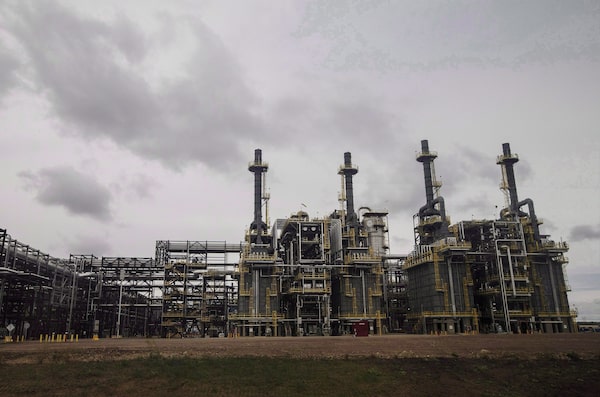
A processing unit at Suncor Fort Hills facility in Fort McMurray, Alta. Teck Resources Ltd. sold its stake in the Fort Hills oil sands project to Suncor Energy Inc. in October to concentrate on extracting metals used in the energy transition.JASON FRANSON/The Canadian Press
France’s TotalEnergies SA TTE-N aims to spin off its oil sands business in what could be the largest Canadian public share listing in two years.
The subsidiary has interests in two projects in northeastern Alberta and is estimated to be worth $2-billion to $3-billion in a market in which oil and gas shares are hot due to global supply worries. Under the plan, TotalEnergies shareholders would be given stock in the form of a special dividend and the new entity would be listed on the Toronto Stock Exchange.
Behind the capital markets machinery involved in such a process is the fact that environmental, social and governance issues loom large. TotalEnergies chief executive officer Patrick Pouyanné has said the high-carbon oil sands business does not fit with his company’s climate policies, and it no longer wants to invest money in it. Of its US$16.3-billion in capital spending last year, US$3.6-billion was directed at electricity and renewable energy.
It is the second long-time oil sands owner in four months to bid adieu to the sector, trumpeting to investors that they are serious about reducing climate-related risks.
In October, Teck Resources Ltd. TECK-A-T sold its stake in the Fort Hills oil sands project to Suncor Energy Inc. SU-T for $1-billion, saying it wants to concentrate instead on extracting metals used in the energy transition. Don Lindsay, who stepped down as CEO last Sept. 30, had previously lamented that the oil sands exposure prevented some institutions from owning Teck stock.
It’s all part of a wider trend of ESG playing an expanding role in the mergers and acquisitions world. Pension funds, asset managers and foundations are increasingly demanding companies they trust with their capital help them achieve their own targets on climate change as well as worker safety, work force diversity, labour policies and other issues.
This can result in companies jettisoning assets that fail to make the grade on those fronts and may be hindering their access to capital. It can also vault potential acquisition targets that help achieve sustainability goals to the top of their wish lists.
In the case of TotalEnergies, the company’s first choice is a public listing, as Mr. Pouyanné sees a very limited field of potential buyers. Indeed, it’s highly unlikely a company not already involved in the oil sands and familiar with the inherent climate risks would have any interest in jumping in with a multibillion-dollar offer.
Only six established oil sands players have signed onto the Pathways Alliance, an industry organization that aims to cut CO2 emissions from operations by installing carbon capture projects.
Still, a sale to one of those players, such as Suncor – TotalEnergies’s remaining partner in Fort Hills – would not be out of the question at the right price.
In an outlook on themes that could dominate ESG conversations in 2023, National Bank Financial analyst Baltej Sidhu highlighted corporate M&A as a big one, even in the face of a backlash that ESG investing has faced over the past year, especially in U.S. political circles.
Even so, ESG is playing a bigger role in the due diligence process for deal-making, and ESG-related risks are being weighed much earlier in transaction processes, Mr. Sidhu said. In addition, multinational companies and those in heavy-emitting industries such as oil and gas are most likely prioritize such factors in M&A discussions.
Some of the aspects being scrutinized are whether an acquisition will bolster or weaken a buyer’s ESG strategy, what the impact of social ills or greenhouse gas emissions within a target’s supply chain will be and whether a target has been accused of greenwashing – making false or exaggerated environmental claims.
In a 2022 survey of global deal-makers, the accounting firm KPMG found that more than two-thirds of respondents said they were willing to pay a premium for companies with “a high level of ESG maturities in areas that align with their ESG priorities.” Half said that uptick would be between 1 and 5 per cent, and one in five said the premium could top 5 per cent.
Jurisdictions with stringent regulations for emissions and climate-risk disclosure, notably the European Union and soon the United States, will see the most ESG-driven takeover action, Mr. Sidhu said in an interview.
ESG investing is already changing the face of the energy industry. Last last year, oil major BP PLC BP-N bought U.S.-based biogas producer Archaea Energy Inc. for US$4.1-billion. Shell PLC RYDAF made its own push into renewable natural gas, buying Danish-based Nature Energy for US$2-billion. RWE Energy, Germany’s largest power producer, bought Consolidated Edison Inc.’s U.S. renewable power business for US$6.8-billion.
Companies that have set short-term and long-term emissions reduction goals will be driven to M&A markets when it becomes clear they won’t be able to achieve them with their current slate of assets and investment plans, he said.
“In the end, it’s all devised as long-term value creation and reducing the risk profile.”